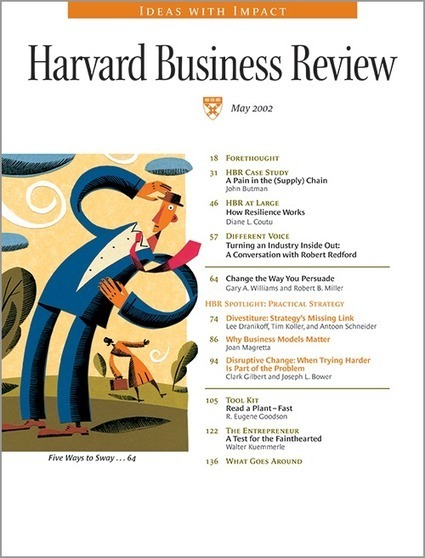 Your new post is loading...
 Your new post is loading...
Some people just seem to bounce back from whatever life throws at them. Whether it’s illness, loss, or tragedy, they do the tough work of picking themselves up, dusting themselves off, and carrying on—even when it seems impossible. If you’ve ever thought, “I could never do that” when looking at one of these apparent “superheroes,” don’t be so sure. It’s actually possible to build resilience to make yourself better able to bounce back from even the most difficult times. “It’s the ability to get back in the game after you’ve had some sort of failure. And indeed, we can learn to become more resilient,” says social scientist and leadership expert Frank Niles, PhD. Niles says there are a number of science-backed areas people can address to help them be more resilient. Here are some ways you can shore up your “resilience bunker” to better prepare for when tough times strike.
Via The Learning Factor
Resilience comes naturally to a lucky few. For the rest of us, it's a trait that can be learned. Here are six habits to cultivate your resiliency.
Via Ariana Amorim
Life isn’t linear. No matter how well thought out your plans, they’ll eventually collide with a reality you didn’t plan on. Learning to "lean into the curves" when life doesn’t unfold as you’d hoped will help spare you untold stress, bounce back faster and emerge better off. Here’s five ways to do just that.
Via The Learning Factor
Around half the population of the United States woke up on Wednesday morning to enormous disappointment. In a stunning upset, Donald Trump defeated Hillary Clinton in the race for president, leaving Trump supporters elated and many Clinton backers devastated. But in my work as a coach, I've found that even the most crushing defeats can ultimately be channeled into energy for forging ahead. Regaining confidence is an uphill battle, and it takes a crowd—or at least two people, talking things out—to pull an someone out of a funk. Here's how it can be done.
Via The Learning Factor
Say you’re a high performer who's risen through the ranks. Now you have even bigger responsibilities. Or you're working your way toward a promotion and need to show your skills and professionalism in the best light. Then the phone call comes. The results of your medical tests weren't good. Or you suddenly have to take care of a loved one in an emergency. Or there's an unexpected financial hit that could spell catastrophe. Whatever the situation, your life just got much more complicated. While intuitively you know that these things can happen to anyone, the anxiety of dealing with such troubling events, coupled with the pressure to continue to perform in your job, amps up the stress to DEFCON 1. "A curveball like that requires sharpening your coping skills and expanding them so that you can deal with what’s being demanded of you," says clinical psychologist Alicia H. Clark, adjunct professor at the Chicago School of Professional Psychology. And there is a strategic approach you can take to help you cope and perform better, even when you’re operating under extreme stress.
Via The Learning Factor
The truth is that life can be tough, business can be hard-hitting and success comes with challenges. What separates those who can hold their own and keep going in times of adversity is a cluster of habits that center on resilience. Resilience means developing a strong solid level of mental toughness. We aren't born with it--it's a habit you develop, a skill you learn. And it's absolutely essential. Here are four core habits of the most resilient people: 1. They're connected to their emotions.
Resilient people understand their emotions and how to manage them. Some people say that suppressing what you feel is the best approach when you're going through tough times, but it's just the opposite--suppressing your emotions can backfire. People who are highly anxious or have a lot on their minds tend to struggle with unwanted thoughts. Resilient people are connected to their emotions and self-aware, which gives them more control. 2. They don't listen to negative voices in their heads.
Resilient people are able to get past the negativity and dig deeper to discover what's triggering it. Then instead of taking it to heart, they're able to turn it into positive intentions. Resilient people are optimistic and believe in their own strength and ability to overcome any problems. In a crisis, a resilient person will be positive, open and willing to find the solution. They will not be dwelling on the problem but looking forward to the future solutions that should be considered.
Via The Learning Factor
D. Christopher Kayes offers advice on operational, strategic, managerial, and reputational resilience in organizational psychology
Via Coloma Canals
This is a fascinating 'classic' HBR article from 2002, written by Diane Coutu on the rather elusive (but highly valued) quality of resilience. Coutu suggests that resilience can be learned (although its not straightforward) and she identified that three qualities that help to define people's abilities to be able to get through periods of great adversity and bounce back after major setbacks: The ability to Face Down Reality and see things as they really are rather than with rose-tintFinding meaning and purpose in times of adversity that building a bridge to a better imagine future stateA habit of ritualised ingenuity - being able to improvise solutions and workarounds when presented with challenges According to one of her interviewees, " More than education, more than experience, more than training, a person’s level of resilience will determine who succeeds and who fails. That’s true in the cancer ward, it’s true in the Olympics, and it’s true in the boardroom.”
Via Matthew Farmer, Kenneth Mikkelsen
|
Resilience matters. In fact, it’s become pretty much the No.1 topic in management and leadership circles. We’re all supposed to be made of Teflon. We’re supposed to be able to cope with the crap that the world (and the world of work) chucks at us. And if we can’t cope we’re supposed to pop off to the hot yoga studio to sweat it out. Or colour-in a complex series of geomantic shapes in super bright fluoro colours. Mindfulness has become the talk of the town and the chief chatter in the office.
However, I can’t help but think that all this is missing the mark when it comes to resilience.
Gradually, the increased interest in resilience as a construct in recent years has seemed to shift the focus away from poor behaviour and poor culture and onto the victim of the poor behaviour and poor culture.
The rise of resilience is all too frequently leading to something sinister and something that needs rejecting out of hand; victim blaming.
Instead of the focus being on the poor manager or on the terrible culture and on the toll that these things take on those who experience them, it’s now much more frequently on the way that the staff can learn to cope with these ‘things’. It’s as if the answer to working for a bully or working in a culture that is less than ideal is to pop off at lunchtime to do some Tai Chi in the local park. And breathe. You’ll feel better equipped to cope with your bullying boss in the afternoon.
It’s nonsense.
Via David Hain
Perception is key to resilience: Do you conceptualize an event as traumatic, or as a chance to learn and grow?
Via Kenneth Mikkelsen
We tend to think of people who have true grit and exceptional perseverance as hard -- they have a thick enough skin and strong enough emotional defenses that whatever life throws at them, it simply bounces off. If you view mental toughness through this prism, it's easy enough to extrapolate how to develop more of it -- challenge yourself, take more knocks, and you'll learn to persevere even when it hurts. But according to a couple of thought-provoking recent articles, this is the pretty much the exact opposite of the truth about real resilience. The heart of exceptional mental toughness, these writers argue, isn't the ability to shut the world out, but a desire to engage it. True grit comes from passion -- from love -- not from emotional hardness.
Via The Learning Factor
It’s hard not to resent Mondays. The day marks the end of the fun and freedom of the weekend—and that’s especially true during the summer, when ordinary Saturdays and Sundays have a carefree vacation vibe. Even if you love your job, the angst of having to go back to the grind on Monday can leave you disorganized and spinning your wheels all day, explains Richard Citrin, Ph.D., MBA, an organizational and consulting psychologist and author of “The Resilience Advantage.” Then you have to spend the rest of the week playing catch up. But while Monday is going to happen whether you like it or not, that lack of productivity doesn’t have to. The key is to adopt a few smart habits on Sunday so you set yourself up for a brighter, more efficient workweek without really cutting into your weekend R&R time. These tips will help you do just that.
Via The Learning Factor
It's human nature to resist change--particularly when it comes in the form of adversity or challenges. But change is inevitable, and developing the trait of resilience helps us not only survive change, but also learn, grow, and thrive in it. Resilience is the capacity to cope with stress and adversity. It comes from believing in yourself and, at the same time, in something bigger than yourself. Resilience is not a trait that people are born with; it involves behaviors, thoughts, and actions that can be learned and developed in anyone.
Via The Learning Factor
If you want a glimpse of the future of technology and its impact on society, study how younger generations interact with one another today. While everyone is talking about Millennials these days, there’s another, potential more disruptive generation behind them…Generation Z.
Via Bobby Dillard
|



 Your new post is loading...
Your new post is loading...




































Several studies showed having a sense of purpose beyond your occupation or everyday role plays a big role in resilience.